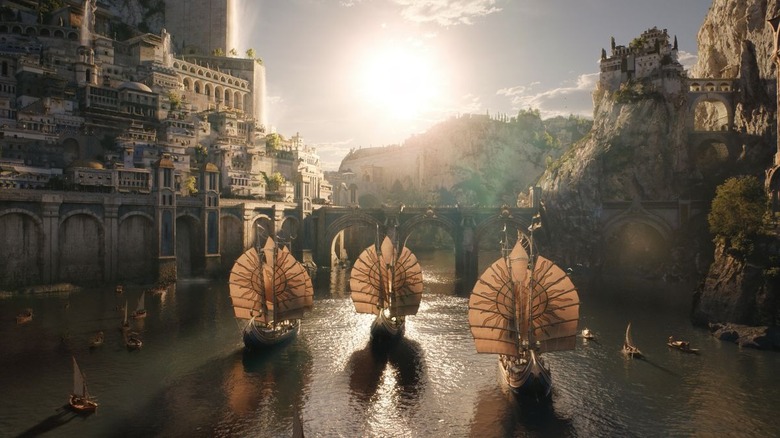What Is Númenor? The Rings Of Power's Most Important Location Explained
Spoilers follow for "The Lord of the Rings: The Rings of Power."
As "The Lord of the Rings: The Rings of Power" explores the vast world of Middle-earth and its neighbors, it was inevitable that the series would feature the live-action debut of Númenor. In the show's third episode, Galadriel (Morfydd Clark) and her newfound friend Halbrand (Charlie Vickers) are taken to the island of Númenor, a kingdom exclusively ruled and inhabited by plain old humans. Bearing a resemblance to the kingdom of Gondor in "The Lord of the Rings" trilogy, Númenor is an ancient ancestor that is far more vast and bountiful. However, the fate of the beautiful kingdom is not so glamorous, and it may serve as the most important location "The Rings of Power" has featured thus far.
In "The Rings of Power," Númenor is introduced as the isolated kingdom of men that, as Galadriel countlessly mentions, was given by the elves as a gift for siding with them in the battle against Morgoth during the First Age. However, their history is far more complicated than that. If the series looks to faithfully adapt the source material, "The Rings of Power" will tell the story of the complex nature of Númenor and its inevitable downfall.
The primary account of Númenor can be contributed to the Akallabêth, the fourth part of "The Silmarillion," but a newer book, titled "The Fall of Numenor," is considered a more organized recount of the kingdom's history. It's not clear if "The Rings of Power' will cover the entirety of the end of Númenor, but it is no coincidence that the book's main players are a major part of the series.
The epic history of Númenor
When the war against Morgoth concluded in the First Age, the Valar felt bad about how much the Three Houses of the Edain suffered so they gave the men the island of Elenna. Located between Middle-earth and Valinor, Elenna became the kingdom of Númenor, subsequently ruled by a bloodline that started with Elros, the son of the half-elven Eärendil. Queen Regent Míriel (Cynthia Addai-Robinson) is the ruler of the kingdom seen in "The Rings of Power," and the last rightful heir to the throne from the books. In Tolkien canon, Ar-Pharazôn (Trystan Gravelle) marries Míriel and gains control of the kingdom by usurping the Queen. Then began the great fall of Númenor, which coincided with the rise of Sauron in the Second Age.
Power-hungry and desperate to live long past his expiration date, Ar-Pharazôn was eventually led astray by Sauron and coerced into waging war with the Valar to capture the Undying Lands. In doing so, Ar-Pharazôn forced the head of Valar to transform the once-flat world into its round shape, burying Númenor and all of its citizens underwater in the process. Luckily, a select few bailed on the kingdom and set sail for Middle-earth, leading to the foundation of the Realms of Exile, including Gondor. If this all sounds familiar, I should mention that the event is referred to as Atalantë, which means "the Downfallen," but certainly sounds like another fictional underwater city (we see what you did there, Tolkien).
"The Lord of the Rings: The Rings of Power" has a lot on its mind, but if it indeed covers the rise and fall of Númenor, then we are in for a treat (unlike the citizens of Númenor, of course).

